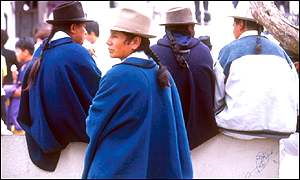“Good morning Angela, how’s your day so far?” Rosa asks – the owner of a local store.
“It’s all right,” Angela says in whispers. She glances over her shoulders. “Have you seen Antonio around?”
Rosa shakes her head as she hands the grocery bags to Angela.
Is everything okay?” Rosa asks suspiciously. Angela wears sunglasses on a cloudy day.
Angela politely chuckles. She grabs the grocery bags and turns around.
Rosa stops her and removes the sunglasses. She gasps, “Did Antonio Mocho hit you?”
“No!” Angela exclaims covering her bruise. “It was an accident. I -uh- hit my face on the wall.”
“Stop lying, Angela,” Maria says in a fury. She pulls Angela in the store.
“But I can’t,” Angela says. “He means well. He needs me. He needs his wife.”
In Ecuador, alcoholism and domestic violence go hand-in-hand in Indigenous and non-Indigenous communities. In Cuenca, a group of researchers led a case study that states “alcohol misuse is the root problem of Indigenous households.” Husbands beat their wives and kids, waste money, lose their jobs, and are never present at home.
Antonio Mocho is an illustration of this reality in Ecuador. Antonio Mocho drinks every night. He beats his wife. He does it again the next day. The next week. The next month. Angela puts up with it because this is the only life she knows – to be his wife.
But who’s Antonio Mocho?
Antonio Mocho is a traditional song originally sung in Kichwa (the Quechua dialect spoken in Ecuador) and currently performed by various folklore groups in Ecuador. Antonio Mocho is also a popular tune played by orchestra bands, technocumbia artists, and last but not least, sanjuanito – a music genre that gave rise to the traditional song on a national and international scale.
According to Land of Winds, sanjuanito and san juan are two genres of Ecuador that are closely related to each other – probably originating in Otavalo, Imbabura. However, san juan belongs to indigenous communities whereas sanjuanito belongs to highland mestizo communities – a music that is also accessible to cities, mestizos, afro-Ecuadorians, Southern Colombians and Northern Peruvians.
It is the “national rhythm of Ecuador.” Sanjuanitos promotes Indigenous culture, oral tradition, and Kichwa pride in our communities. It becomes a “safe space” where Ecuadorians express their “Indianness” without getting criticized by the society.
I want to highlight that sanjuanito also provides an opportunity to tell our stories. Its lyrics include love, breakups, nostalgia, one-way trip, farm work, and Ecuadorian landscapes. It also speaks of important festivals, legendary figures, and communal support of ex-pat Ecuadorians in the US and Europe. Popular songs like Nuca Llacta, Caraway, Curiquingue, and Cantando Se Alegre are examples of Ecuadorian Indigenous songs fused with sanjuanito elements to promote national pride and storytelling.
It is also said that the origins of sanjuanito (currently in debate) “would be a pre-Incan rhythm which would have suffered many influences, adaptations, and style combinations through the centuries. Such a rhythm is to be frequently found in the repertoire of many Andean musical groups of Ecuador, much to the delight of an audience that enjoys this music as much as their ancestors probably did centuries ago.”
Back to Antonio Mocho, we will see how sanjuanito transforms this character from an alcoholic husband to an adoring lover. The transformation seems to be a collective re-interpretation of Antonio Mocho and re-defining effort of Ecuadorian masculinity in modern-day society. In the original song, the stanzas state:
Antonio Mocho machaska yallikun/ Rosa Milapa ishtankupi machashka/ warmita makankapa yallikum
Antonio Mocho is drinking his night away/ he is getting drunk at Rosa Mila’s store/ he beats his wife when he gets home.
Jose Mono machashka harkakun/Alcalde kani nishpa nin pawakun/ warmita makashpalla kawsakun
Jose Mono, drunk, is halting/ I’m governor he says jumping/ beating his wife is how he lives
Chucha, karaju nishpa washaman yallikun/ warmita makankapak yallikun
Chucha carajo he says behind his back/ he beats his wife when he gets home.
Sadly, the song reflects the reality that many Indigenous communities deal with in terms of alcoholism and domestic violence. As previously mentioned by Land of Winds, the new adaptation suffers a transformation process that downplays his alcoholism and portrays him as an adoring lover. This gives a new personality to Antonio Mocho – a man who chases women and who has a chance to show his loving side – for the new generation in the early 90s. Ximena, Ecuadorian singer, describes Antonio Mocho as a handsome Indigenous man who is set to conquer her heart.
“Ven a verme en la manana guambrito/ yo te espero en mi ventana bonito/ me escapare calladito guambrito/ y nos vamos de parranda bonito/ ay para darte mi carino guambrito/ y adorarte a mi lindo bonito/ porque eres mi consetido guambrito/ porque eres mi preferido bonito.”
“Meet me in the morning, my young man/ I’ll wait for you by my window, my handsome man /we’ll quietly escape, my young man / and we’ll go party, my handsome man / oh I”ll you give my affection, my young man/ and I’ll adore you, my handsome man/ because you’re my spoiled one, young man/ because you’re my favorite one, handsome man.
However, in Maria de los Angeles’ case, another Ecuadorian singer, she tells a different story of Antonio Mocho in early 2000. She begs him to stay by her side. Without his love, she does not know what to do with her life. In this interpretation, Maria loves Antonio with all her heart, and there is no mention of domestic violence or alcoholism in the song. She recounts Antonio Mocho as follows:
“Anda diciendo por ahi que ya no estas/que te hayas ido y que jamas tu volveras/y me dejas padeciendo por tu amor/no te vayas de mi lado por favor.”
“They’re saying you’re not here / that you’re gone and you’ll never come back / and you let me suffer for your love / please do not leave me here alone.”
Los Canaris Band speak about Antonio Mocho in their sanjuanito melody, too. They describe him as a dangerous fellow – “ten cuidado con el Antonio Mocho – que ese esta peligroso ya vean.” They encourage people to dance around him, to do the round dance, and to observe him dancing with precaution. In this case, Indigenous people perceive Antonio Mocho as a “dangerous fellow” which can indicate hostility.
In summary, Antonio Mocho is going through a dramatic character transformation based on Ecuadorians re-interpretation in the past two decades. He used to be an abusive alcoholic husband, but now he is a handsome man, a lover, or still a “dangerous” fellow. These characteristic traits reflect a national attempt to re-negotiate his role as an Ecuadorian man in modern-day society. What do Ecuadorians want to see in Antonio Mocho? What do they expect of him? What do they want to see in other Ecuadorian men?
Even though Antonio Mocho is a catchy tune, it follows the sanjuanito element of nostalgia, melancholy, and love. Sanjuanito provides a national space where Ecuadorians can collectively transform his story, among others, into a positive message for society. Antonio Mocho slowly but steadily leaves his abusive life of alcoholism and domestic violence and enters a new phase that reflects hope in recovery, healing, and inspiration for young men.
My paternal family have their Antonios but the new generation is the first to break the machista cycle for the first time. I think it has to do with the fact that my cousins and I were exposed to a diverse pool of cultures, expectations, beliefs, and opinions outside of Ecuador. We met people who respected their families and showered them with affection and love. We met men who protected their women and mentored their kids.
It’s like all of a sudden we woke up from a trance and realized that machismo is not okay in our family. We had to do something about it. We knew machismo destroyed family circles and interrupted childhood development. We made a conscience decisoin to break the intergenerational abusive cycle and start a clean slate.
We also had a second wake-up call when we “discovered” that Antonio Mocho is a sanjuanito song rooted Indigenous elements to tell a national story. One of us said, “Ecuadorians kept their Indio tradition alive after all these years to tell our stories.”
I know in my heart that 1) sanjuanito will continue to flourish in the future and 2) Antonio Mocho will transform again to hopefully become a role model for young men in Ecuadorian society. Antonio Mocho will inspire youth to treat each other with respect and love and to rise from alcoholism, machismo, domestic violence, and other forms of abuse that destroy us as people in the world.







Reblogged this on yeseniamujerdemaiz and commented:
Macho NO!